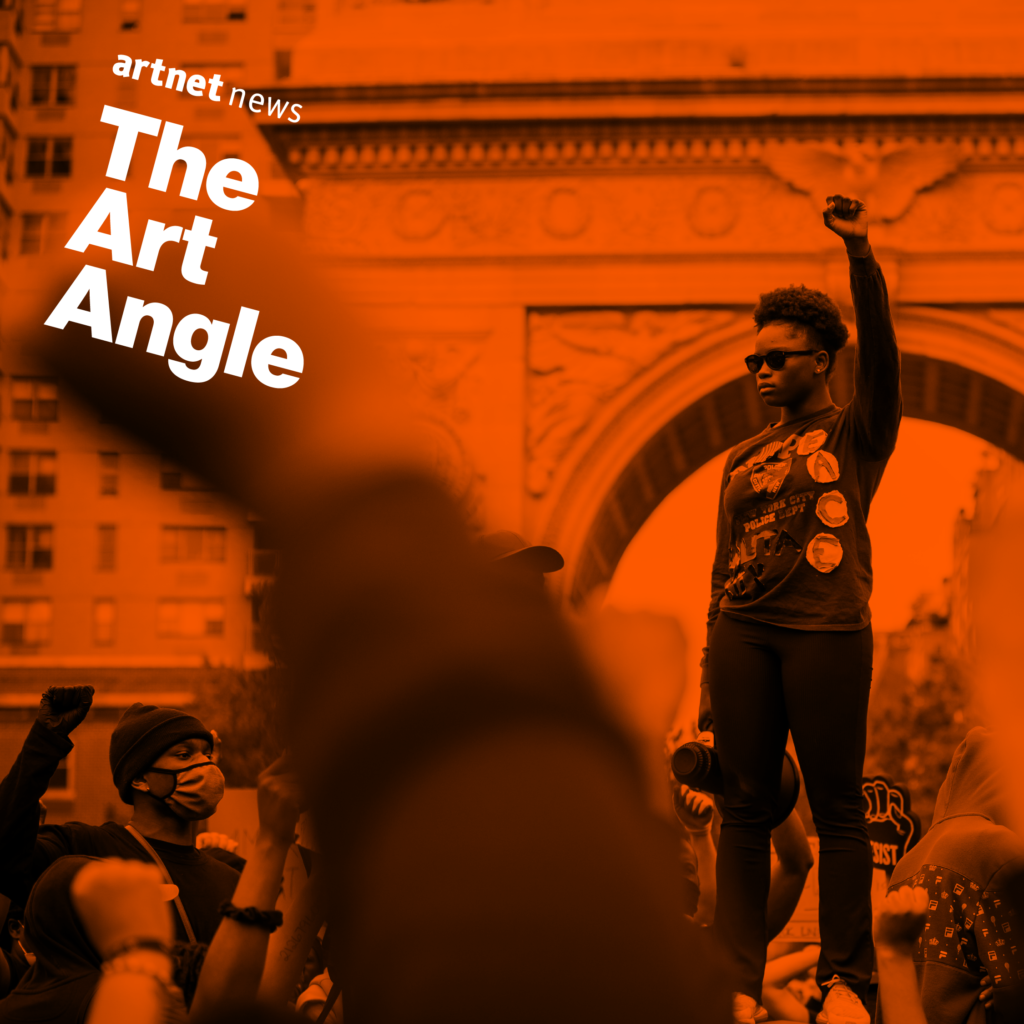The Art Angle
The Art Angle Podcast: Four Artists on the Front Lines of the George Floyd Protests
On this week's episode, four artists share their experiences in the movement demanding justice for Floyd and all black Americans.

On this week's episode, four artists share their experiences in the movement demanding justice for Floyd and all black Americans.

Artnet News

Welcome to the Art Angle, a podcast from Artnet News that delves into the places where the art world meets the real world, bringing each week’s biggest story down to earth. Join host Andrew Goldstein every week for an in-depth look at what matters most in museums, the art market, and much more with input from our own writers and editors as well as artists, curators, and other top experts in the field.
As American citizens entered Memorial Day weekend this year, the nation was already in turmoil. Nearly 100,000 lives had been lost to a colossal public-health crisis, with a disproportionately high number of the victims being African American; tens of millions of people had filed for unemployment since mid-March; and many states central to the US economy remained largely locked down, with few solid indications of when they would resume anything resembling business as usual.
Then, after a Minnesota deli owner accused George Floyd of buying cigarettes with a counterfeit $20 bill on Memorial Day, the four police officers who responded to the call suffocated Floyd on camera during his arrest—and the national conversation immediately pivoted to America’s original and deadliest sin: institutional racism.
Although Floyd’s death has now become the centerpiece of perhaps the broadest-based US protest movement since the Vietnam War, the tensions between (mostly) white authorities and communities of color has been building for centuries. In fact, another unarmed black American, 26-year-old healthcare worker Breonna Taylor, was killed in her own bed by Louisville police just days before Floyd’s murder. The fatalities offer fresh proof of the lethal discrimination that has shaped American history since its beginning. But they have also quickly shifted widespread concerns for safety from COVID-19 to widespread demands for justice and systemic change from police and all levels of government.
On the first Friday of the demonstrations sparked by the Floyd tragedy, Artnet News’s art and design editor Noor Brara sought out a wide variety of artists willing to share their stories from the protests (and beyond). By the following Monday morning, she had gathered personal accounts from 18 artists that ranged from the painful, to the terrifying, to the uplifting as they joined (or continued) in the movement for action.
On this week’s episode of the Art Angle, Brara brings four of those stories to our listeners, in their own words. Artists Ebony Brown, Candy Kerr, Marcus Leslie Singleton, and Darryl Westly—all black Americans—spoke to Artnet News about the devastating repetitions of history, the fatigue of trying to educate white America, and how their protest experiences shape their artistic practices.
Listen above and subscribe to the Art Angle on Apple Podcasts, Spotify, SoundCloud, or wherever you get your podcasts. (Or catch up on past episodes here on Artnet News.)
The Art Angle Podcast: The Rise and Fall of Anne Geddes, Queen of Baby Photography
The Art Angle Podcast: China’s Most Adventurous Museum Director on Global Art’s Post-COVID Future
The Art Angle Podcast: YouTube’s No-Nonsense Art Guru on How to Unlock Your Inner Artist
The Art Angle Podcast: How Marina Abramović Became the Center of a Vast Satanic Conspiracy Theory
The Art Angle Podcast: Ai Weiwei on the Coronavirus, China, and Art’s New Role
The Art Angle Podcast: How Photography Is Being Revolutionized in the Coronavirus Era
The Art Angle Podcast: Why Germany’s COVID-19 Relief Plan Is the Envy of the Art World
The Art Angle Podcast: The Unbelievable True Story of the Mystical Painter Agnes Pelton
The Art Angle Podcast: Three Ways Coronavirus Will Transform the Art World